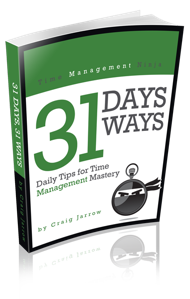
Do you have a routine for starting your day? Most people have one, but if yours involves pressing the snooze button 4-5 times, you may need to think about a more effective way to start your day.
Today, I want to talk about routines for starting the day. Specifically, how to plan and prepare for your day’s events and obligations.
What is your daily routine?
Do you preview and prepare for your day, or do you head into it blindly?
I am not a believer in time management systems that bring more complexity than effectiveness. (Hint: If your system requires a flowchart, it’s probably too complex!)
Instead, the simplest routine is usually the most effective return on time spent.
The Best Dead Simple Way to Start Your Day
There are many things you should do to prepare for your day that will save you time. However, if you boil it down to the basics, here is the simplest routine to start your day to ensure that you are ready and prepared.
You may say it’s elementary, to which I respond, “Then why aren’t you doing it every day?”
1 – Calendar
You would be amazed at the percentage of people who start their day without reviewing their calendar. Then they act surprised when they miss a meeting or appointment. “Oh, I didn’t even remember that was on my calendar!” Well, if you are not going to look at it, why bother keeping a calendar in the first place?
Reviewing your calendar before your day starts not only allows you to prepare for the day’s events, but also plan around them. If you are meeting blocked all day, you need to determine your strategy for getting things done, also.
2 – Todo list
I used to work with a manager who prepared his todo list each day by simply tearing the top page of his legal pad off each morning. Every day he started with a clean slate. This is not the best strategy.
Review your previous day’s todo list to prepare for today’s. (It may be best to use a software solution that automatically brings un-done todos forward.)
Similar to your calendar, if you are not looking at your todo list, you are flying blind. To know what you should be working on, you must know what is on your list.
3 – Plan
Now that you now what is on your calendar, and what tasks you need to accomplish, you can come up with your attack plan. When do certain things need to get done? When can you plan them into today’s schedule? What things will not get done today?
Your plan for the day will ensure that you maximize your time and productivity. Really, it is all about making a conscious choice of what you intend to do.
4 – Prepare
Most people stop their morning routine after they plan their day. But, the next step is perhaps the most important. “Preparing” for your day will bring you the most impact.
How does preparing differ from planning? Preparing is actually doing your homework. Preparing is doing the advance things that you need to do in order to execute your plan.
Do you show up to meetings without having reviewed the topic and materials? Do you show up to appointments without the proper requirements? Doing these simple things in advance will increase your efficiency dramatically.
I find that 20-30 minutes of preparation can save 2-3 hours in a day. Make sure you do your homework.
5 – Bonus Step: Empty Your Inbox
You could stop there with your Daily Routine and you would be ahead of 90% of individuals.
But, I have one bonus tip.
Emptying your Inbox at the beginning of each day is a very empowering feat. Not only will you have a strong sense of control, but you will uncover any lurking items that may disrupt your day. It will keep you one step ahead of the curve.
I find that by emptying and acting on the easy stuff early, that it clears up much of my day. The important stuff goes on my todo list. The simple requests get answered immediately. It starts the day on a productive note, and prevents many interruptions throughout the day.
Do it Every Day
These simple 5 steps are a “Dead Simple Way to Prepare for Your Day.” So, why aren’t you doing them every day?
If you are doing some of them, which are you missing? What would it take to make them part of your routine?
 I am the author of Time Management Ninja and help individuals and companies reclaim their time to be more productive. As well, I am the author of the book
I am the author of Time Management Ninja and help individuals and companies reclaim their time to be more productive. As well, I am the author of the book 

Great post! I have been making a real strong effort to keep my inbox empty since I started following you on Twitter. Its not that my inbox was out of control, it was more because I was not getting back to people in a timely manner. Keeping my inbox clean is a way to ensure that I always respond to emails quickly, so that I can delete or file the original email. Thank you for helping me maintain a clean inbox, and outstanding stewardship with my contacts.
Great post! I have been making a real strong effort to keep my inbox empty since I started following you on Twitter. Its not that my inbox was out of control, it was more because I was not getting back to people in a timely manner. Keeping my inbox clean is a way to ensure that I always respond to emails quickly, so that I can delete or file the original email. Thank you for helping me maintain a clean inbox, and outstanding stewardship with my contacts.
I am not sure that reading the inbox each morning is a good way to start a day!!!!! What can you say about that? Why do you advice this’
I am not sure that reading the inbox each morning is a good way to start a day!!!!! What can you say about that? Why do you advice this’
Great advice! Really.
Emptying the inbox in the morning certainly has its merits. But if emptying the inbox also means actually working on things (as opposed to just putting them on a todo-list) then there is a huge risk of ending up working on whatever is latest and loudest instead of what is most important.